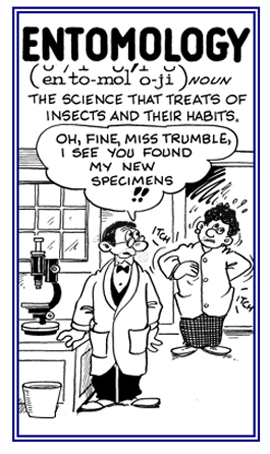tomo-,-tom, -toma, -tomic, -tomize, -tome, -tomical, -tomically, -tomist, -tomous, -tomy; -otomy
(Greek: cut, incision; section; more often used as a suffix)
2. Etymology: from French entomologie (1764), coined from Greek entomon, "insect" + logia, "study of".
Entomon is the neuter form of entomos, "having a notch or cut (at the waist)"; so called by Aristotle in reference to the segmented division of insect bodies.
Scientists who study insects (there are close to a million that can be studied) are called entomologists. Then why aren't they called "insectologists"? Well, they are.
The word insect comes from the Latin word insectum, meaning "cut up" or "divided into segments".
The plural of insectum, namely insecta, is used by scientists as the name of the taxonomic class that insects belong to.
This Latin word was created in order to translate the Greek word for "insect", which is entomon and literally means "cut up" or "divided into segments", and it is the source of the word entomology.
The Greeks coined this term for insects because of the division of insect bodies into three segments, now called the head, thorax, and abdomen.

Go to this Word A Day Revisited Index
so you can see more of Mickey Bach's cartoons.
2. The embodiment or summation of certain qualities: Henry is the epitome of strength because he works out at the fitness studio as often as possible.
3. A person or thing which is representative of or typical of the characteristics or general quality of a whole class or group: Ted's car was once the epitome of low cost transportation.
4. Etymology: from Greek epitome, "abridgement"; from Latin epitome, "to cut short, to cut down, or to cut into".

Go to this Word A Day Revisited Index
so you can see more of Mickey Bach's cartoons.
2. An operation for the relief of irreducible hernia, by cutting through the neck of the sac.
2. The dissection of a cadaver.
Related cutting-word units: cast-; castrat-; -cise, -cide; -ectomy; mutil-; put-; sec-, seg-; temno-; trunc-.


